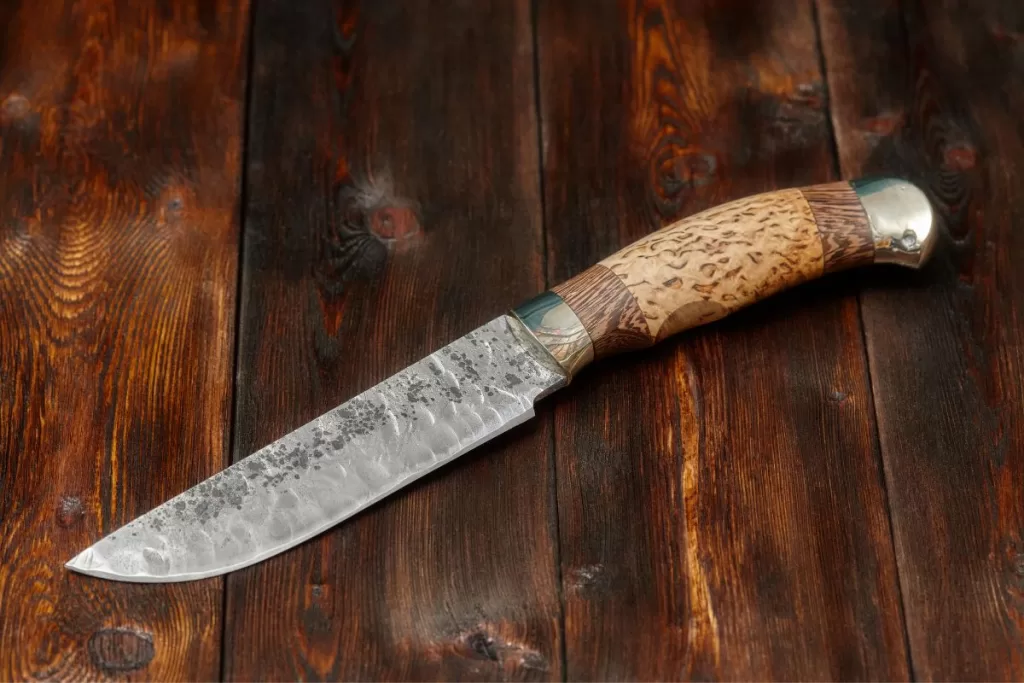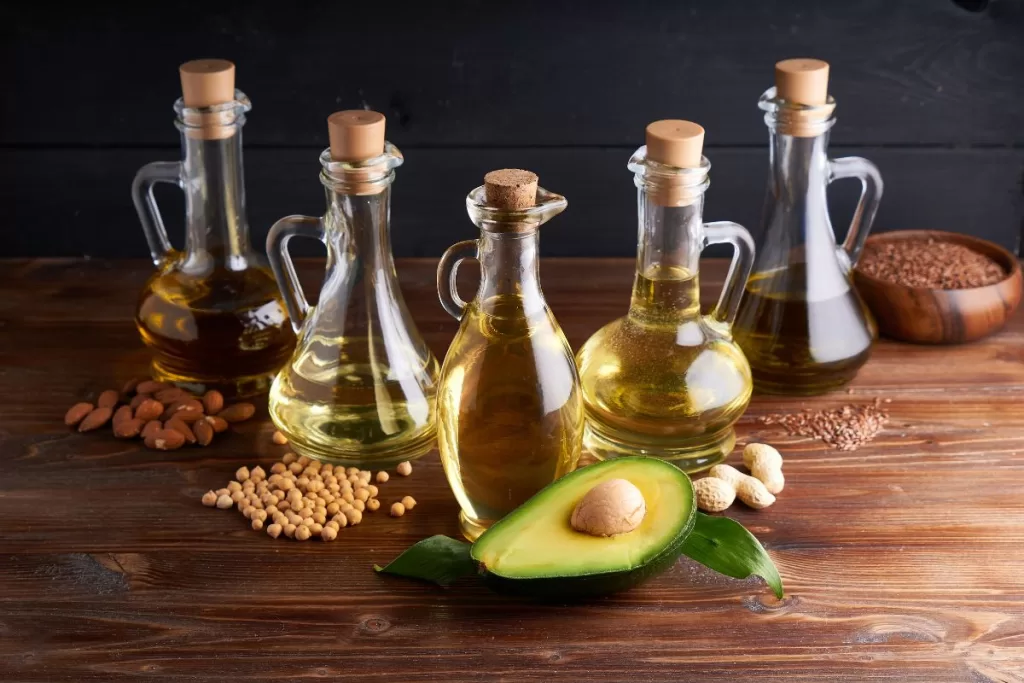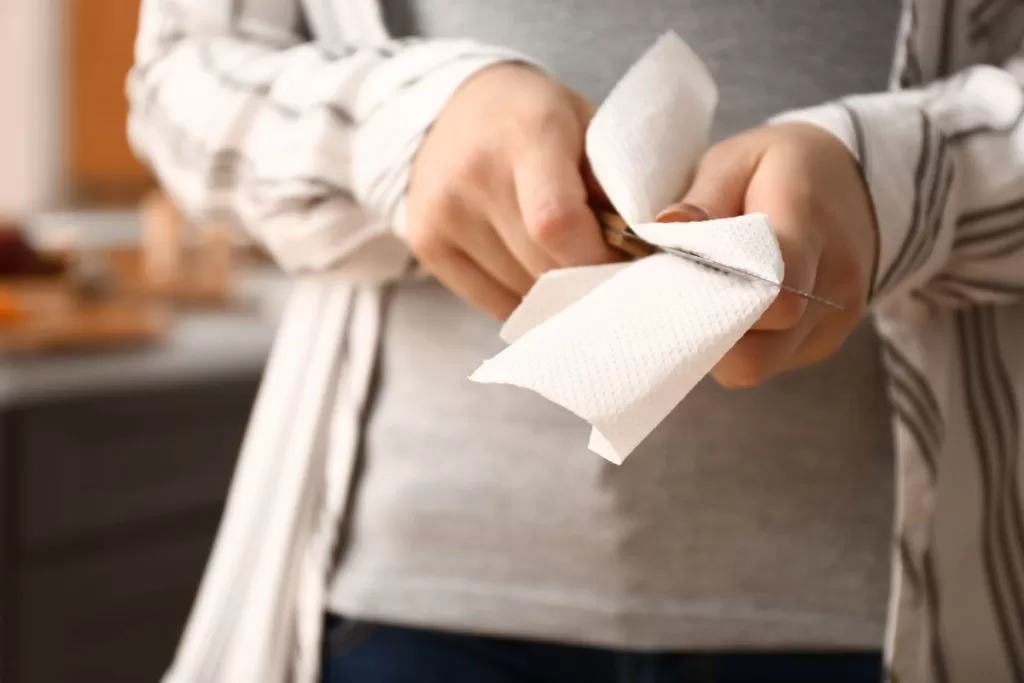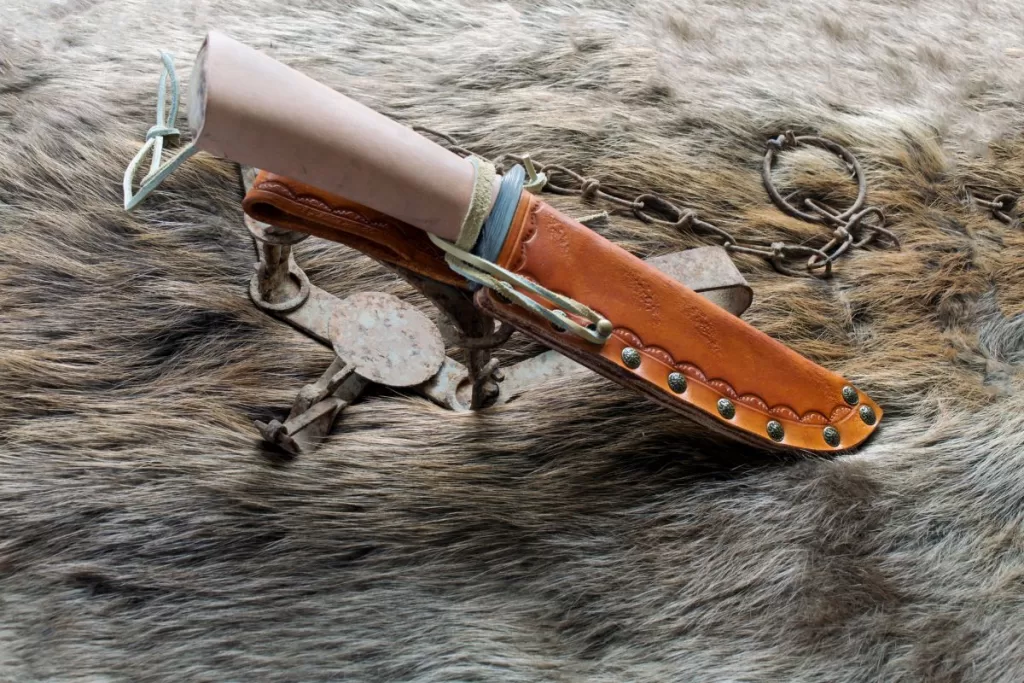Oiling your Damascus steel knife is an important part of its maintenance and will help it last for years to come. But proper oiling isn’t just a matter of applying any oil; you need to be mindful of the type of oil used and how often it’s applied.
In this article, we’ll discuss which oil is best for Damascus steel knives, how often it should be applied, and the steps necessary to properly oil a Damascus steel knife.
So, grab your favorite oil, and let’s get started!
The Importance of Oiling Your Damascus Steel Knife
First things first, let’s chat about why oiling your Damascus steel knife is essential. In a nutshell, it helps prevent rust and corrosion while keeping the blade smooth and well-preserved. The unique patterns of Damascus steel are not only breathtaking but also a result of the intricate process of folding and welding various steel types. Oiling ensures that this masterpiece remains in tip-top condition for years to come.

How Often Should You Oil Your Damascus Steel Knife?
There’s no one-size-fits-all answer here, as the frequency depends on factors like climate, usage, and storage conditions. However, a good rule of thumb is to oil your knife at least once a month or whenever you notice it’s starting to look a bit dull or dry.
If you’re using your Damascus knife regularly in the kitchen or for outdoor activities, you’ll want to oil it more frequently – say, every couple of weeks. On the flip side, if your knife is a cherished display piece, you can get away with oiling it every few months.
The Right Oil for the Job
Now that we know how important it is to oil our Damascus steel knives, let’s talk about the best oils for the job. You’ll want a light, food-safe, and non-toxic oil, such as mineral oil, Tuf-Glide, or even a high-quality vegetable oil in a pinch.
Personally, I swear by Ballistol, a non-toxic and biodegradable multi-purpose oil. I’ve been using it for years on my Damascus chef’s knife, and it’s never let me down. Plus, it’s safe to use around food, which is a huge bonus for any culinary enthusiast.

A Step-by-Step Guide to Oiling Your Damascus Steel Knife
Ready to give your knife the TLC it deserves? Let’s get started!
Step 1: Clean Your Knife
Before oiling, make sure your knife is spotless. This is important because any debris or residue on the blade can hinder the oil’s effectiveness and potentially cause damage.
Use warm, soapy water and a soft cloth to gently clean the blade. Avoid using abrasive cleaners or scrubbing pads, as they can scratch the steel.
Be cautious when handling the knife during cleaning to prevent accidental cuts.
Don’t submerge the knife in water, especially if it has a wooden handle, as this can cause the handle to warp or crack over time.
Step 2: Dry the Knife Thoroughly
After cleaning, it’s crucial to dry the blade completely to avoid any moisture getting trapped under the oil, which could lead to rust and corrosion.
Use a clean, dry cloth or paper towel to carefully dry the blade.
Make sure to get into any nooks and crannies, especially around the handle or any decorative elements.
Allow the knife to air-dry for a few minutes to ensure that all moisture has evaporated before proceeding to the next step.

Step 3: Apply the Oil
Now it’s time to apply your chosen oil to the knife.
Put a few drops of your chosen oil onto a clean, lint-free cloth. An old cotton t-shirt or microfiber cloth works well.
If you’re using a spray oil, lightly spray the cloth instead of applying it directly to the blade. This helps prevent over-application and ensures a more even coating.
Step 4: Spread the Oil
Gently rub the oil onto the blade, making sure to cover every inch. A thin, even coat is all you need for effective protection.
Don’t forget to oil the spine, tang, and handle if they’re made of metal. This helps prevent rust and corrosion on all parts of the knife.
Pay special attention to any etchings or engravings on the blade, as these areas can be more susceptible to rust.
Be careful not to overdo it with the oil, as excess oil can attract dirt and dust.
Step 5: Buff the Blade
Once the oil has been applied, it’s time to buff the blade to remove any excess oil and create a thin, protective barrier on the steel.
Use a clean, dry cloth to gently buff the blade, using a circular motion to ensure an even finish.
If you notice any streaks or excess oil, continue buffing until the blade looks clean and shiny.
Step 6: Store Your Knife Properly
After oiling and buffing your Damascus steel knife, proper storage is essential to keep it in optimal condition.
Store your knife in a dry, well-ventilated place away from extreme temperatures or humidity.
Consider using a knife sheath, blade guard, or knife roll to protect the blade from dust and accidental damage.
Avoid storing your knife in a closed drawer or container, as this can trap moisture and promote rust.

And there you have it! By following these steps and regularly oiling your Damascus steel knife, you’ll keep it looking stunning and performing at its best for years to come.
Frequently Asked Questions About Oiling Damascus Steel Knives
Can I use any oil on my Damascus steel knife?
It’s best to use a light, food-safe, and non-toxic oil such as mineral oil, Tuf-Glide, or Ballistol. Avoid using heavy or petroleum-based oils, as they can be too thick and may not provide adequate protection.
How do I know if my knife needs oiling?
If your Damascus steel knife starts to look dull or dry, or if you notice any signs of rust or corrosion, it’s time to oil it. As a general rule, it’s a good idea to oil your knife at least once a month, or more often if you use it frequently.
Can I use WD-40 on my Damascus steel knife?
While WD-40 can help remove rust and protect against corrosion, it’s not recommended for long-term use on Damascus steel knives due to its potential to harm the steel’s integrity. Stick to a light, food-safe oil instead.
Do I need to oil my knife even if I don’t use it often?
Yes, even if your Damascus steel knife is a display piece or is rarely used, it still requires regular oiling to protect the blade from rust and corrosion and to preserve its unique appearance.
How do I remove rust from my Damascus steel knife?
If you notice rust on your knife, gently scrub the affected area using a soft cloth or sponge dipped in a solution of baking soda and water. Rinse the blade thoroughly, dry it completely, and then apply a fresh coat of oil.
Is olive oil a good option for oiling my Damascus steel knife?
While olive oil can work in a pinch, it’s not the best option for long-term use. Olive oil can become rancid over time, which can negatively impact your knife’s appearance and performance. Stick to a mineral oil or another food-safe, non-toxic oil for better results.
Can I use gun oil on my Damascus steel knife?
Some gun oils, like Ballistol, can be used on Damascus steel knives as they are food-safe and non-toxic. However, always check the manufacturer’s recommendations and ensure the oil you choose is suitable for knives and safe to use around food if you’re using the knife in the kitchen.
Final Thoughts
Taking care of your Damascus steel knife is not just about preserving its functionality, but also about maintaining the rich history and unique craftsmanship behind its creation. By regularly oiling your knife, you’re not only protecting your investment but also paying homage to the centuries-old art of Damascus steel making.
In this blog post, we’ve covered the importance of oiling your Damascus steel knife, how often you should do it, the best types of oil to use, and a detailed step-by-step guide on how to properly oil your knife. With these tips and tricks in your arsenal, you’re now well-equipped to keep your cherished Damascus knife in pristine condition for years to come.
Remember, a well-maintained Damascus steel knife is not only a functional tool but also a stunning work of art. So go ahead, give your knife the attention and care it deserves, and continue to enjoy the beauty and performance of your Damascus steel blade.

